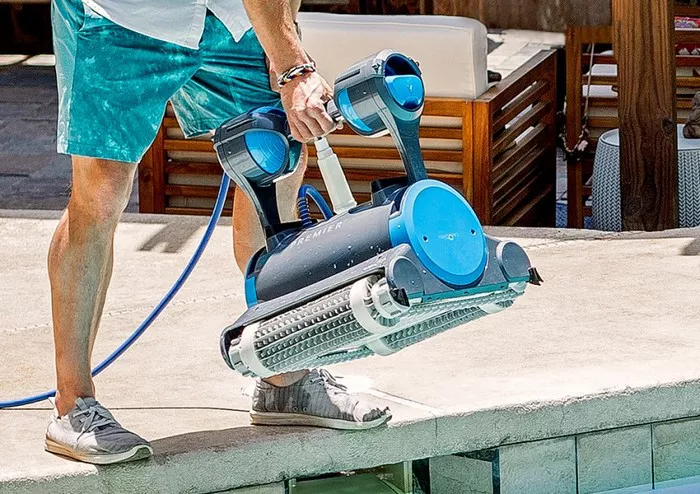Maintaining a pool can be both a joy and a chore. While the prospect of a refreshing dip on a hot day is appealing, the task of keeping the pool clean and pristine can often deter many pool owners from fully enjoying their investment. This is where automatic pool cleaners come into play, revolutionizing the way pools are maintained by offering efficient, hands-free cleaning solutions.
What is an Automatic Pool Cleaner?
An automatic pool cleaner is a specialized device designed to clean swimming pools automatically, reducing the manual effort and time required for maintenance. These cleaners operate independently of the pool’s filtration system and are equipped with various mechanisms to remove dirt, debris, and contaminants from the pool floor, walls, and sometimes even the waterline.
Types of Automatic Pool Cleaners
There are several types of automatic pool cleaners available on the market, each employing different technologies and methods to clean pools effectively. The main types include:
Suction-Side Pool Cleaners: These cleaners operate by attaching to the suction line of the pool’s filtration system. They use the pool pump’s suction to move around the pool, collecting debris in a filter bag or the pool’s filtration system.
Pressure-Side Pool Cleaners: These cleaners use the pressure generated by the pool pump to propel themselves around the pool. They often have their own debris bags to collect dirt and require a separate booster pump for optimal performance.
Robotic Pool Cleaners: Robotic cleaners are fully independent units with their own built-in filtration systems and motors. They operate on low-voltage electricity and do not rely on the pool’s circulation system. Robotic cleaners are known for their thorough cleaning capabilities and energy efficiency.
See Also: What You Need to Know About Dolphin Pool Cleaners
Advantages of Using an Automatic Pool Cleaner
The benefits of investing in an automatic pool cleaner extend beyond just convenience. Here are some key advantages:
Time-Saving: Automatic pool cleaners operate autonomously, freeing up your time to enjoy the pool rather than cleaning it.
Energy Efficiency: Robotic pool cleaners are particularly energy-efficient compared to traditional cleaning methods, as they use low-voltage electricity.
Improved Pool Health: Regular cleaning with an automatic pool cleaner helps maintain balanced water chemistry and reduces the need for excessive chemical treatments.
Extended Equipment Lifespan: By keeping your pool clean and reducing strain on the filtration system, automatic cleaners can prolong the life of your pool equipment.
Choosing the Right Automatic Pool Cleaner
Selecting the best automatic pool cleaner for your needs depends on various factors, including pool size, shape, and the type of debris typically found in your pool. Here’s a guide to help you make an informed decision:
Pool Size and Type: Consider whether your pool is above-ground or in-ground, as well as its size and shape. Some cleaners are better suited for larger pools or those with irregular shapes.
Type of Debris: If your pool is prone to specific types of debris, such as leaves, fine dirt, or algae, choose a cleaner with features designed to handle these effectively.
Ease of Maintenance: Look for cleaners that are easy to clean and maintain. Robotic cleaners often have easily accessible filter cartridges that can be rinsed and reused.
Energy Efficiency: Check the energy consumption ratings of different cleaners, especially if you’re opting for a robotic cleaner that operates independently.
How Automatic Pool Cleaners Work
The mechanics behind automatic pool cleaners vary depending on their type. Understanding how each type works can help you appreciate their effectiveness:
Suction-Side Cleaners: These cleaners attach to the suction port or skimmer of the pool and move around the pool floor using the suction generated by the pool pump. They collect debris in a filter bag or the pool’s filtration system.
Pressure-Side Cleaners: These cleaners use the pressure of water returning to the pool to propel themselves. They often have their own debris bags and may require a booster pump for optimal performance.
Robotic Cleaners: Robotic cleaners operate independently of the pool’s filtration system. They have their own motors and filtration systems, allowing them to clean the pool efficiently without relying on the pool pump or filter.
Maintenance Tips for Automatic Pool Cleaners
To ensure your automatic pool cleaner operates at peak performance and lasts longer, follow these maintenance tips:
Regular Cleaning: Clean the cleaner’s filter or debris bag after each use, or as recommended by the manufacturer.
Inspect and Replace Parts: Check the cleaner for any worn-out parts, such as brushes or wheels, and replace them as needed to maintain optimal cleaning performance.
Store Properly: Store the cleaner in a cool, dry place when not in use, and protect it from direct sunlight and harsh weather conditions.
Service Annually: Depending on usage, consider servicing your cleaner annually to keep it in top condition.
Conclusion
Investing in an automatic pool cleaner can transform your pool maintenance routine from a time-consuming chore to a hassle-free task. Whether you opt for a suction-side, pressure-side, or robotic cleaner, each type offers unique benefits that cater to different pool sizes, shapes, and cleaning needs. By choosing the right automatic pool cleaner and maintaining it properly, you can enjoy a clean and inviting pool throughout the swimming season, with minimal effort and maximum enjoyment.

